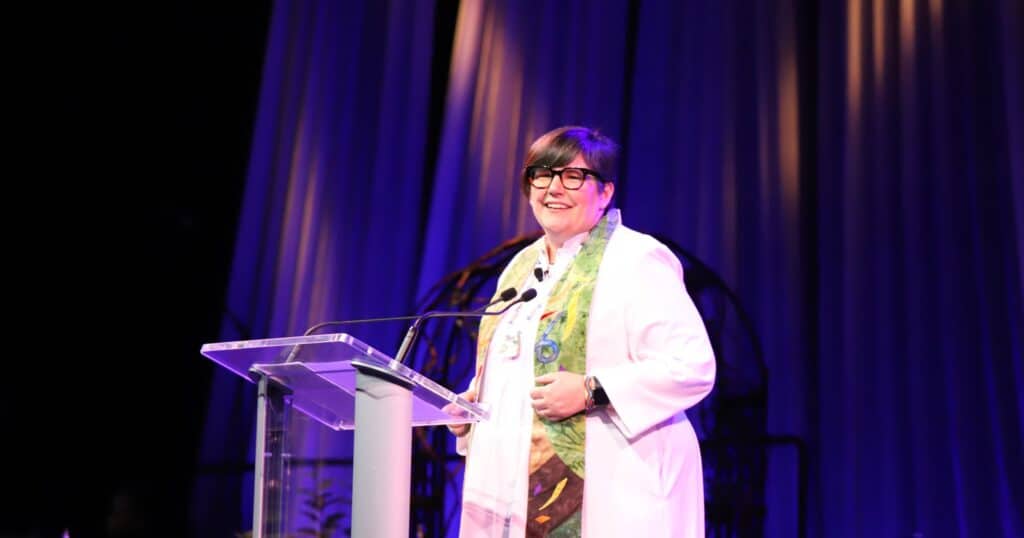Sunday worship at Synod uplifts prophetic visions to resist the status quo, act in love
“Imagine the world that Isaiah saw as possible,” the Rev. John Dorhauer invited those gathered in person and virtually for General Synod’s Sunday worship service that centered around the vision of the biblical prophet.
The United Church of Christ’s outgoing General Minister and President depicted visions of a trans child being affirmed in their identity, of homes for those who are unhoused, of birthing people who can claim and make decisions about their own bodies, of schools with no need for active shooter drills, of clean air.
“Isaiah imagined such a world,” he said, while the sound of a heartbeat was played on a drum. “We long for such a world. We dream for such a world. And in this moment, we pray that the beating heart of our mother earth, the beating heart of our young children, the beating heart of our aging, wizened elders is enough to inspire us to courage and commitment to the rebuilding and the reshaping of shalom.”
Words, music and images from Isaiah filled the hall on Sunday, June 2, during community worship.
An interpretive Scripture reading of Isaiah 65:19-24 offered images of “abundant life,” “enough for everyone to eat to their fill” and “no more children born into a world of horrors — no more gun violence, no more cruelty for fun to rile up a base, no more bullying and book bans, no more restrictions to gender affirming healthcare, no more restrictions to diversity, equity and inclusion or teaching our history.”
‘Fighting for a reclamation’
The Rev. Carmen Lansdowne, moderator of The United Church Canada, offered a sermon with a vision of reclamation and centering of marginalized communities amid a context where “our children are being born into a world of horrors.”
She spoke specifically to the broad impact of colonialization and, as a member of the Heiltsuk Nation, the history of her people.
Acknowledging the significance of her role as the first Indigenous woman to lead a Canadian denomination, Lansdowne added that she is “rooted in a story much older and more embodied than this sacred Jesus story from our sacred Christian texts. The story I am rooted in is older than the story of David or Moses or Abraham. My people, the historic people, have lived in the central coast of British Columbia for at least 15,000 years.”
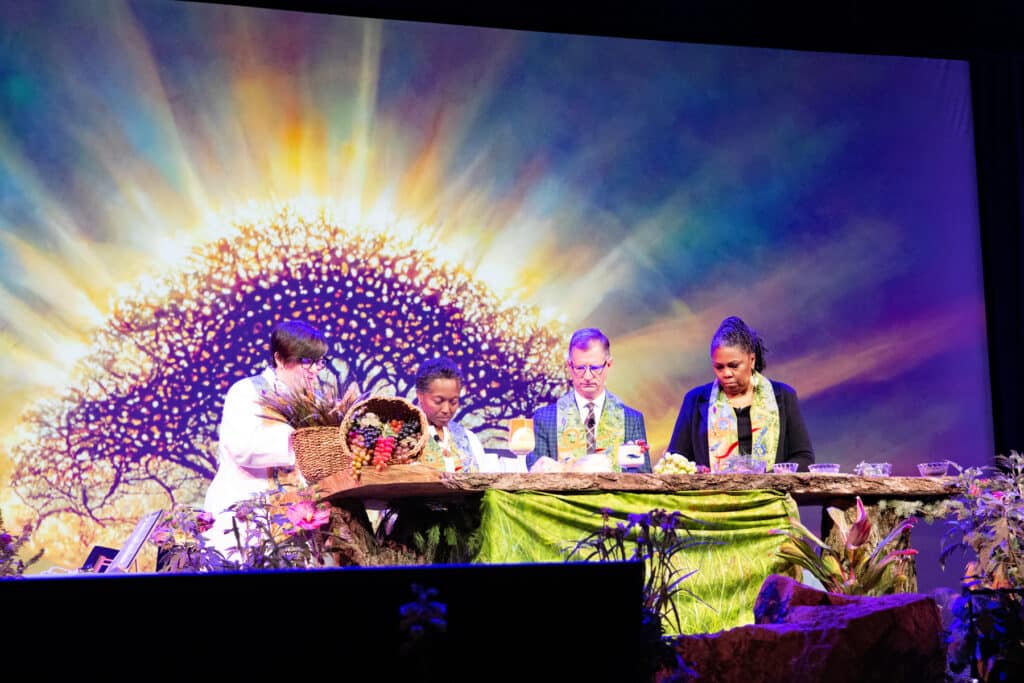
In that long history, she described how the Heiltsuk people lived in their own territories as “feared warriors” and led sustainable lives “grounded in community, in place and in a worldview that saw the world as a place of abundance and reciprocity.”
Though imperfect, Lansdowne said their history assures her there are different ways of functioning than the current U.S. political and economic system filled with “the compulsion to dominate and to assert power even at the expense of humanity and this fragile ecosystem that is Pachamama and our very survival.”
She said that “despite the righteous Indigenous anger at the continued failure to recognize our inherent rights as the people who lived on this land and who have been so adversely impacted by colonization and the colonialist thinking and white supremacy that remains, we are beautifully resilient, recovering and fighting for a reclamation of a world vision where we don’t have to live in the competition for scarce resources or to believe the lies that uphold an idea of unending economic growth measured solely by GDP, which discounts completely the non-calculable effects of business as normal on humans and the planet.”
‘Resist the status quo’
Lansdowne beckoned to the biblical prophets like Isaiah who, akin to today, “lived through times of social breakdown” and “saw the ways in which the compulsion to power and domination led to the complete and utter destruction. And they said no more — not in the name of my God.”
She challenged people in the room, especially those of “middle-class, educated, comfortable whiteness,” to listen to more marginalized people and “just believe them.”
“Every time you resist the status quo, you are acting in love,” she said. “You are saying, I love who you are, exactly how you are, and I value you enough to trust your perception, even if it’s different from mine.”
This is the kind of non-romanticized love that Jesus talked about, she said — “an active and tremendously taxing and daring love. It is the love that makes no sense, except in the face of the fact that the alternative simply does not work.”
Jesus and the prophets assure us, she said, of the necessity and possibility of creating “a new world order” based in this kind of love.
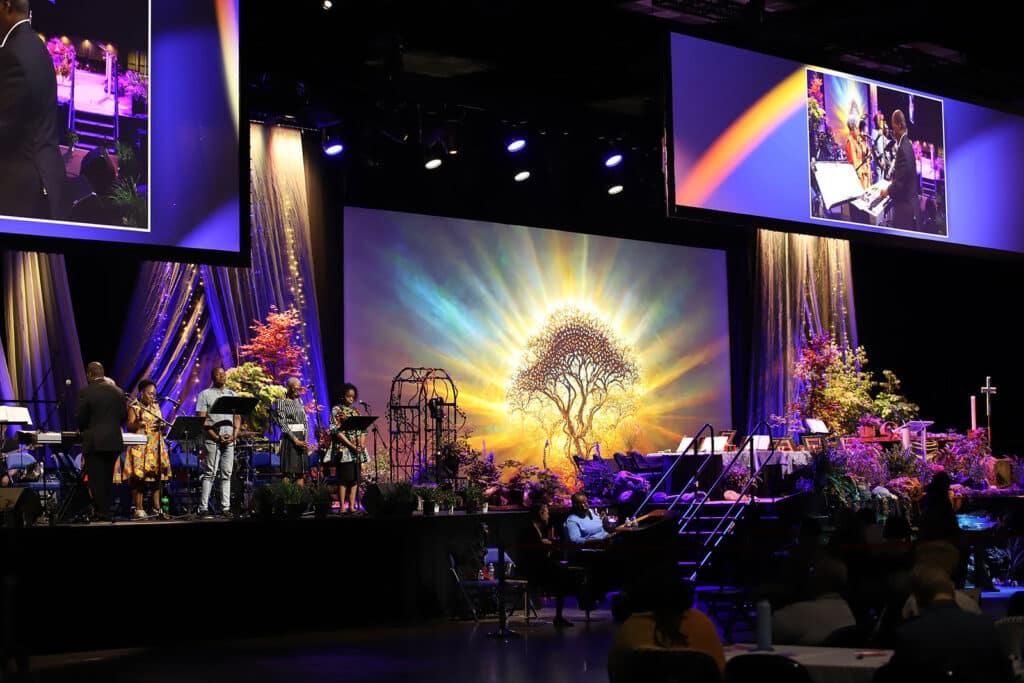
‘The antidote to fear’
Lansdowne uplifted forgiveness as a practice that the Heiltsuk people gained through Christianity — the very concept, she said, that offers answers for today. “We cannot live in the fear of what is, or what was or what is lost. We have to live in forgiveness, and in love, and in today — like Reverend Nadia [Bolz-Weber] said — because love is the antidote to fear.
“When we are rooted in love, we cannot keep from building community, from practicing equity and justice. We cannot keep from standing up for our siblings and saying, not in my name, not in the name of my God. We cannot help from building relationships that have space for vulnerability and trust and respect so that when we hurt each other, because we are human and we will, we don’t have to live in fear because we have been forgiven. We are already forgiven. But we must always strive to be worthy of that forgiveness.”
‘Fruits of our sacrament’
Lansdowne joined the three UCC officers to celebrate communion with a liturgy that honored the land and those who first tended the land.
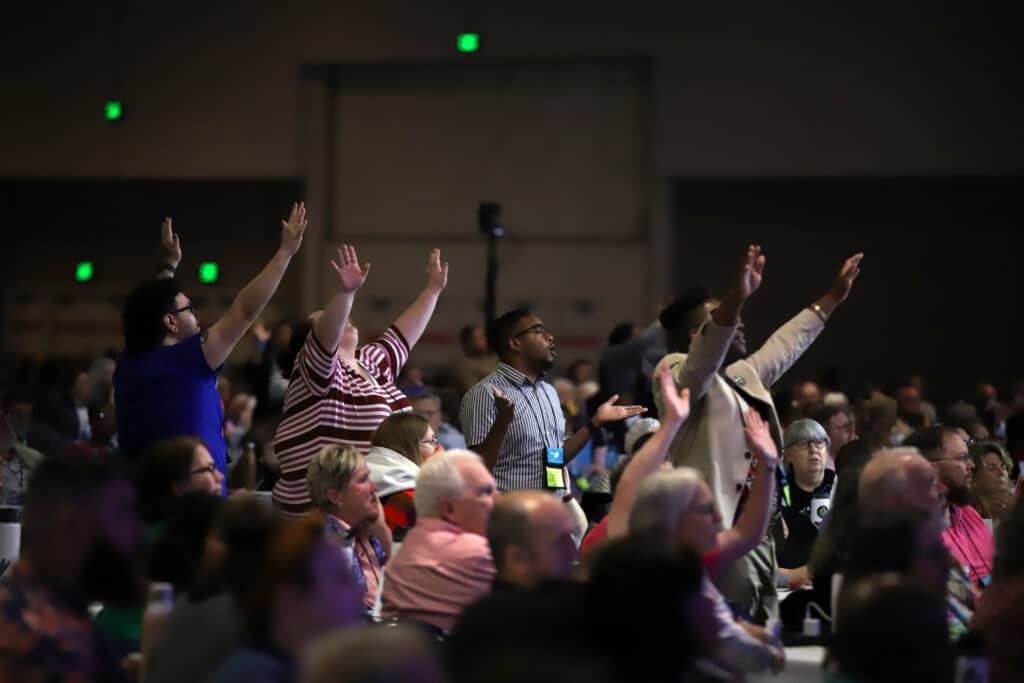
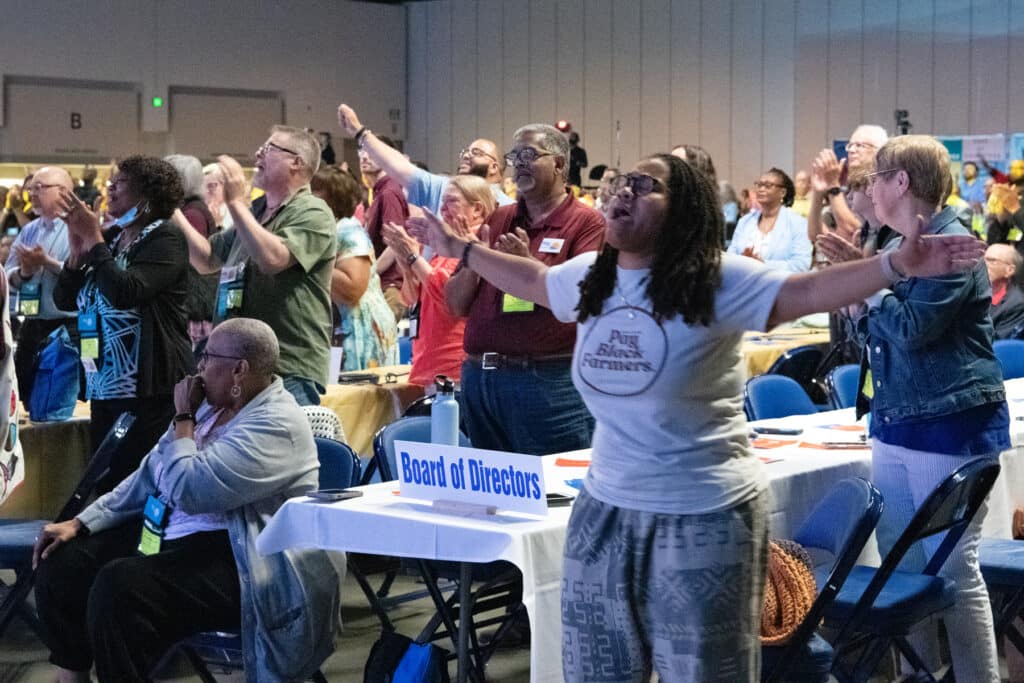
“From the strength of those who have gone before comes the seeds for grains and grapes. The land has given birth to the fruits of our sacrament,” Associate General Minister the Rev. Traci Blackmon spoke as part of the liturgy.
The worship service was also filled throughout with music and song, including handbells and singing led by the General Synod band.
Content on ucc.org is copyrighted by the National Setting of the United Church of Christ and may be only shared according to the guidelines outlined here.
Related News
A Moment of Silence
The weekend news was alarming. Two students shot and killed with 9 injured at Brown University...
Read MoreIn hope-filled worship service, UCC and United Church of Canada celebrate full communion past and future
On Saturday, Dec. 13, many from the United Church of Christ (UCC) and the United Church of...
Read More‘A Gift of God to the World:’ Christmas greetings from the General Minister and President
As Christmas quickly approaches, UCC General Minister and President/CEO the Rev. Karen Georgia...
Read More